The Cebu Pacific corporate boardroom, on the fourth floor of the airline’s headquarters in Pasay City, has a magnificent and largely unobstructed view of the Ninoy Aquino International Airport’s parallel runways.
As I’m led into this room to interview Michael “Mike” B. Szücs, the newly appointed chief executive officer of Cebu Pacific, I begin to wonder if this setting would be less than ideal. The hypnotic, carefully choreographed spectacle of planes taking off and landing just a stone’s throw away occurs every few minutes or so, the roaring sound of jet engines thankfully muffled by thick panes of glazed glass. If I felt this would be too distracting, I was wrong. From the get-go, Mike proves to be an interesting and engaging subject, effortlessly chatting away over the next hour and a half – as a member of the JG Summit Corporate Communications team would later describe it – at a “million words per minute,” and we hang on to his every word.
The Journey Begins
Taking on the CEO role at CEB is Mike’s latest stop in a 36-year globetrotting career, which began soon after his graduation from the University of Manchester in 1987 with an aeronautical engineering degree.
As modern music fans might know, Manchester in the 1980s was a fertile breeding ground for future British music legends, churning out seminal bands like New Order, the Smiths, the Stone Roses, and countless others. Instead of being a rockstar, though, Mike pursued a loftier dream: “I wanted to become a pilot. I wanted to join the Royal Air Force,” he shares.
At the time, unfortunately, his family heritage would ground those ambitions. His father had immigrated from Hungary during the uprising of 1956, and although Mike was born in the UK in 1966, Hungary was still a member of the Warsaw Pact, the Soviet-era counterpart to NATO. In short, he was deemed a security risk. (This has a happy ending — Mike’s 25 year old son is now fulfilling that dream, having been accepted into the RAF.)
To get his career going, Mike moved to London after then-Prime Minister Thatcher's initiatives to deregulate the city’s financial markets, and soon began doing well, first as a bond trader and later, as a foreign exchange dealer. However, the call of the skies was simply too strong.
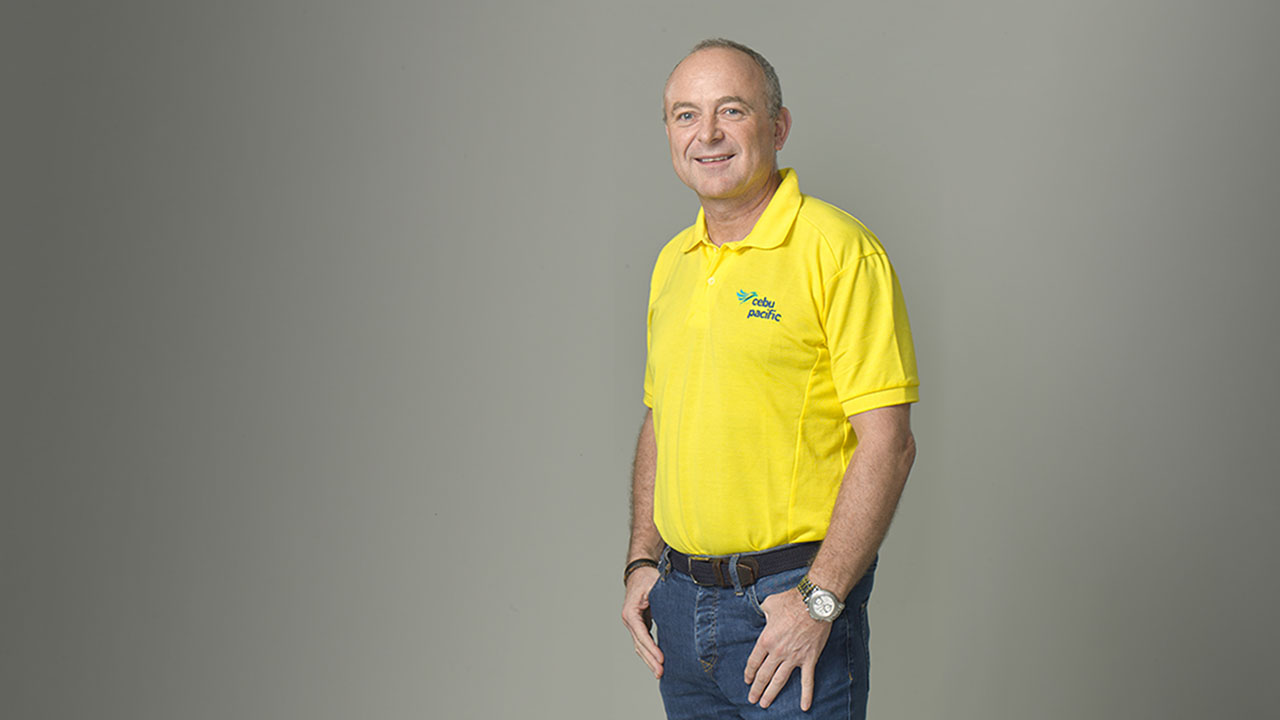
“It was during my time as a forex dealer that somebody pointed out to me, why don't you apply for the British Airways Cadet Pilot scheme? And so I did. I got accepted, but the role wasn't available for about another 12 months. So, while waiting, literally every month I was going, ‘Will I go? Will I stay?’ because it was a very good job. Ultimately, when I had to make the decision, I said, I've had my time in the City of London. Let's go and do what I always wanted to do, which was to fly.”
Joining British Airways in 1990, Mike spent his first six years exclusively as pilot, and then gradually eased into managerial roles. In 2000, he became the Chief Pilot of Gatwick, the airline’s second-largest base of operations. Then, in 2001, came the tragic events of 9/11 that shook up the airline industry. With the headwinds of that period, Mike was asked to combine the operations of two subsidiaries of British Airways in Gatwick, which he turned into an opportunity to learn about other aspects of the airline industry. “I'd always been a pilot and in operations, but I wanted to get into understanding other bits of the business. So I then moved over into what was General Manager of World Sales for British Airways. I went into the commercial side with very fresh eyes to understand how the business worked. It was very foundational for me in terms of my broader career, that I got the commercial experience as well as the operational experience.”
Around the World
With that solid foundation, Mike found himself in the sights of other aviation industry players, starting with easyJet, who lured him into joining the British low-cost carrier in 2003, initially as its Operations Director. “It was moving away from the commercial side back into operations, but the job was a mix of everything. It was a flight ops, it was maintenance, it was cabin services, it was airports – the whole shooting match.”
He was promoted to Chief Operating Officer in 2005, but by then, he developed a hankering for something bigger. “I guess I always wanted to be kind of like the big cheese,” admits Mike candidly.
The following year was a big one, as he embarked on his first overseas posting. “I haven't lived in the UK since 2006, but I regularly return to visit,” shares Mike much later in the interview, thoughtfully reflecting on all the places he’s been to for work.
From the UK, Mike wound up in Mexico, where he joined Viva Aerobus, a startup airline, as its CEO. “Startups are crazy tough! It helps if you're young. When I went over there, I was 40 just turning 41. And I think that helped because the stresses are significant, mentally and physically as you help drive and energize things,” says Mike about the experience.
The first two years were exceedingly tough with overcapacity in the market and fuel prices at historic highs. But, by its third year, Viva Aerobus had become steadily profitable, and it was time to find a new challenge. Next stop: Spain.
When he was named CEO of Spanair in 2009, Mike was tasked with restructuring an airline that many deemed as bankrupt. Long story short, a deal to restart operations with prospective investors fell through, and Mike had to pull the plug on the airline. It might seem a little odd, then, that he reflects on a perceived failure as one of his proudest moments, but looking at it more closely shows his determination, fighting spirit, and conviction in the face of seemingly insurmountable challenges.
“I spent two and a half years working my butt off doing that. We almost did it. It was probably some of the hardest work that I've ever done. In some way, some of the best work I've ever done. We did the most extraordinary things in terms of a restructuring, along with the incredible headwinds of a brutal recession that Spain was going through,” shared Mike.
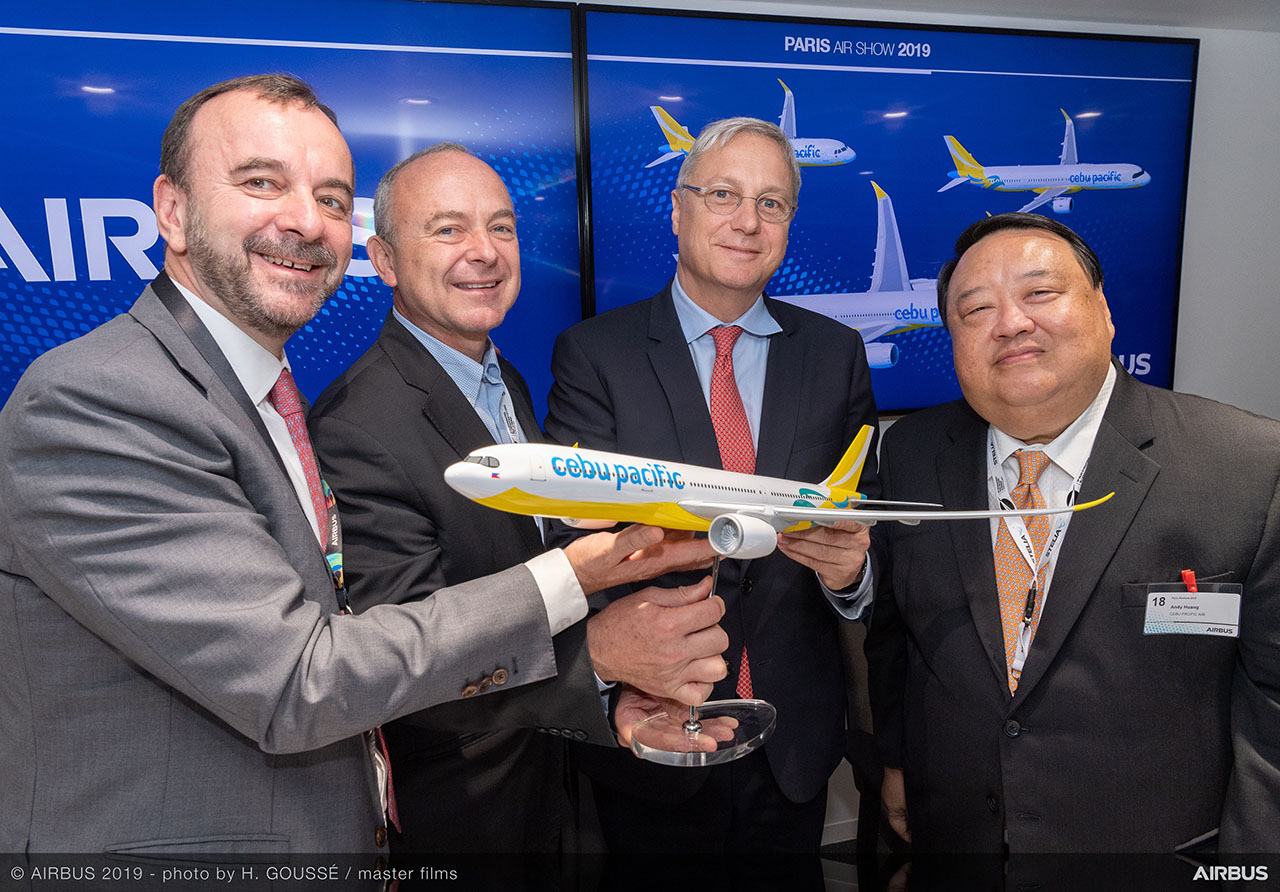
From Europe he made his way back to South America, this time in Colombia, where he became interim CEO of VivaColombia, another low-cost carrier. “After Spain, I wanted to take some time off but I was encouraged to go back and help out the same investors from Mexico in Colombia, which I did. They started an airline there which had run into problems. I guess I was sort of a seasoned and scarred CEO. I mean, once you've done a startup and shut an airline down, you've been through a few experiences.”
In just nine months, Mike successfully righted the ship. “I did my bit for the shareholders for the second time around, and it was time to find my next long-term gig.
In aeronautical terms, that would be a distance of around 13,300 km away from Medellin, where VivaColombia was based, to Doha, Qatar, where he was asked by Akbar al Baker, the CEO of Qatar Airlines, to set up its subsidiary airline in Saudi Arabia. “It was very exciting, and we were moving very fast. We had bought brand-new aircraft and we were well on track, but then the Qataris and Saudis had a falling out.”
Due to developing tension between the two countries at the time, Al Maha Airways, which was supposed to serve routes between Qatar and Saudi Arabia, never had a chance to get off the ground. “It's only more recently that they've started getting back together again. We were very close to actually being able to fly, maybe six months away from launch, but we were just cut in our tracks.”
Al Maha’s loss was to become Cebu Pacific’s gain.
Uncharted Territory
Cebu Pacific had entered Mike’s radar through an airline executive who was being recruited to join the planned Qatari airline. “He’d worked in CEB previously before coming to Saudi Arabia. He told me about Cebu Pacific, so I kind of had an understanding of it. And so, later on, when the opportunity came up, I was naturally excited.”
Piquing his interest was the chance to finally work in Asia. “I've been a tourist to Asia, places like Singapore and Hong Kong, cities that I've always loved and still love to this day, but I actually hadn't been to the Philippines. So I said, ‘Okay, I'm interested in this one.”
He flew in, met Lance Gokongwei, and interviewed for the job in October 2015. Bringing to the CEB his deep well of knowledge and experience in multiple aspects of the aviation industry, Mike officially began his role as Chief Executive Adviser in February 2016.
Whether it’s a coincidence or not, CEB’s gross revenues steadily climbed in Mike’s first four years on the job, from PHP 61.9 billion in 2016 to PHP 84.8 billion in 2019. The pandemic brought an abrupt end to that winning streak, a topic reserved for later in our discussion.
Helping his transition to life in the Philippines was, of course, meeting his wife Vida, and then later becoming a dad to two daughters, now aged 3 and 1, adding to his brood of three grown-up children from a previous marriage. “I’m understanding the Filipino culture better as time goes on, having a Filipino wife helps, so I hope I'm not as clumsy as before. When you think you're trying to be sensitive or trying to be respectful, you can always put your foot in it, say things in the wrong way. Hopefully, I don't fall into those traps so often anymore.”
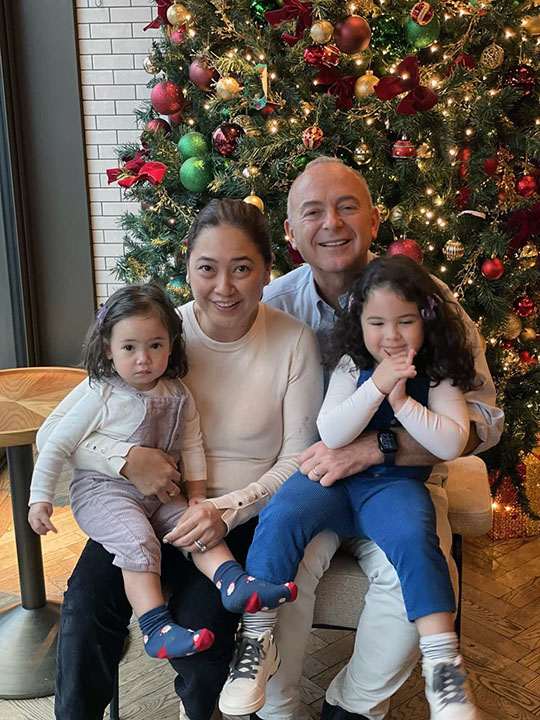
Cutting Through the Turbulence
When Mike first came on board, he saw that there were a lot of things going for CEB, but he also spotted a few that needed to be addressed before the airline could get to the next level.
“It was very strong in terms of its position in the marketplace, it had a very strong domestic market share, and was a profitable business,” he says.
Realizing that CEB was different from the other companies he’d run – it wasn’t a start-up, it didn’t need rescuing, and financially it was doing well – the best thing he could do was figure out how to make the airline’s success more sustainable. “I wanted to know what’s the next thing we can build on, figure out how sustainable it was in terms of its ability to scale, and adapt to the way that consumer expectation was changing. From a resilience point of view, I didn’t think we were quite there yet.” He added, “It was time for Cebu Pacific to look at itself and say how can it be more robust? How could it be better in terms of service delivery, how can it be a better employer? These were the things that would take it to the next level of sustainability.”

One of the areas that Mike zeroed in on was making CEB a leader in handling disruption. “If you say ‘I'm going to be world-class in everything’, it’s simply not going to happen. Do we have the best flatbed seat in all of aviation? No, we don't, that's not our market,” he states simply as a matter of fact. “So, where do we want to be a reference point? Where are we going to be world-class? We have to be world-class in disruption management. Not because we create a lot of it but we have to deal with an enormous amount of it.”
Among the reasons behind this, Mike reveals, are the geography and weather conditions of the Philippines, which he describes as the most operationally difficult environment that he’s ever worked in. Infrastructure-related disruption is also a threat, such as the malfunction of the country’s air traffic control situation on January 1, 2023. As such, Mike advises that CEB has to consistently find ways to deal with, adapt, and respond to any kind of disruption. “And so we consciously invested in it. We've got the systems in terms of the technology that's helped back that, but also our decision-making protocols.”
Over the years, Mike has spearheaded the implementation of best-in-practice crisis management protocols, with a classification of bronze, silver, or gold escalation, based on the severity of the event. “With what happened on New Year’s Day, straightaway our protocols kicked in and they worked, but it’s taken a long time to put that there. Technology has played a great part. We've made massive investments in terms of technology for the customer benefit, and also for the employee benefit too.”
In terms of environmental sustainability, the airline has performed extremely well in that aspect too, proof of this was being named Asia Environmental Sustainability Airline/Airline Group of the Year at the CAPA - Centre for Aviation’s annual Environmental Sustainability Awards for Excellence last November. “Each passenger that flies with us, their carbon footprint is much, much less than flying with anybody else because of the efficiency of our aircraft. We've got a better seat configuration. In fact, our new A330neo is, without a doubt, the lowest carbon footprint aircraft per passenger in the world,” says Mike proudly.
Another major initiative in this sector is CEB’s use of Sustainable Aviation Fuels, but Mike says a transition to SAF will be costly and will take a great deal of time. In the meantime, there are things that can be done now, the bits of “low hanging fruit” as he calls it, to help lower carbon emissions such as being mindful of the fuel consumption of CEB’s trucks and pushback tugs that often sit idling on the runway and installing solar panels on its buildings.
Regarding the topic of disruption, it is inevitable that the Covid pandemic – the greatest disruptor that the airline industry has ever seen – comes up. Following a record high in revenues to go with a healthy net income of Php 9.12 billion in 2019, it’s no secret that the next two years were difficult for CEB. Things improved significantly in 2022, as its domestic capacity exceeded pre-pandemic levels, and this year, Mike expects CEB to match or exceed the total flying capacity – domestic and international – by April, especially as many of CEB’s Asian markets, particularly Hong Kong and Japan, have finally reopened for tourism.
Looking back at the critical steps the airline took to keep itself above water during the most difficult days of the pandemic, Mike cites the implementation of the future size and shape program, the recapitalization of the airline with foreign investor support, and opening a clear line of communication with its customers and staff. “I think we recognized quickly the magnitude of [the pandemic]. So we made some very, very quick decisions, starting with putting together the Future Size and Shape program.”
There were two elements to the process. The first was restructuring what had been a successful business, and the other was raising new capital to provide the airline liquidity to ride out the storm. Planning the Future Size and Shape program took roughly six weeks with different teams working around the clock. In the end, “the plans were solid,” says Mike, acknowledging that many of the elements were “an acceleration of what we'd had in our OGSM, the five-year plans, the long-term strategies that we had.”
One of the workstream heads involved in the grueling planning sessions, Chief Finance Officer Mark Julius Cezar, shares that Mike had been “a constant source of strength and inspiration at CEB during the difficult days of the pandemic,” and was effective in driving the company’s strategic direction. “With his unfailing energy and persistence, he promotes a high-performance culture at CEB and encourages all of us to provide direct and honest feedback,” adds Cezar.
The recapitalization of the airline was the next major step, which eventually brought in new partners, International Finance Corporation, IFC Emerging Asia Fund, and Indigo Philippines LLC, who invested US$250 million in CEB. “It was a feather in our cap to have someone like Indigo, who have got investments in a number of some of the world's best LCCs, coming in and investing here, because they're very particular about who they choose to invest in and they saw us as an opportunity.”
With the new partners, did CEB’s approach to governance or operations change, we ask. “We've always been very transparent,” is his reply. “Yeah, there are requirements on things like the environment, sustainability, and governance from these new external investors, but I think we already ticked the majority of those boxes anyway! Our approach is, we're not going to hide anything. We're actually going to give you information. We're going to give you our forecast, we're going to tell you how it is. We're going to tell you the bad and the good. Hopefully there's more good than bad,” adds Mike, knocking on wood.
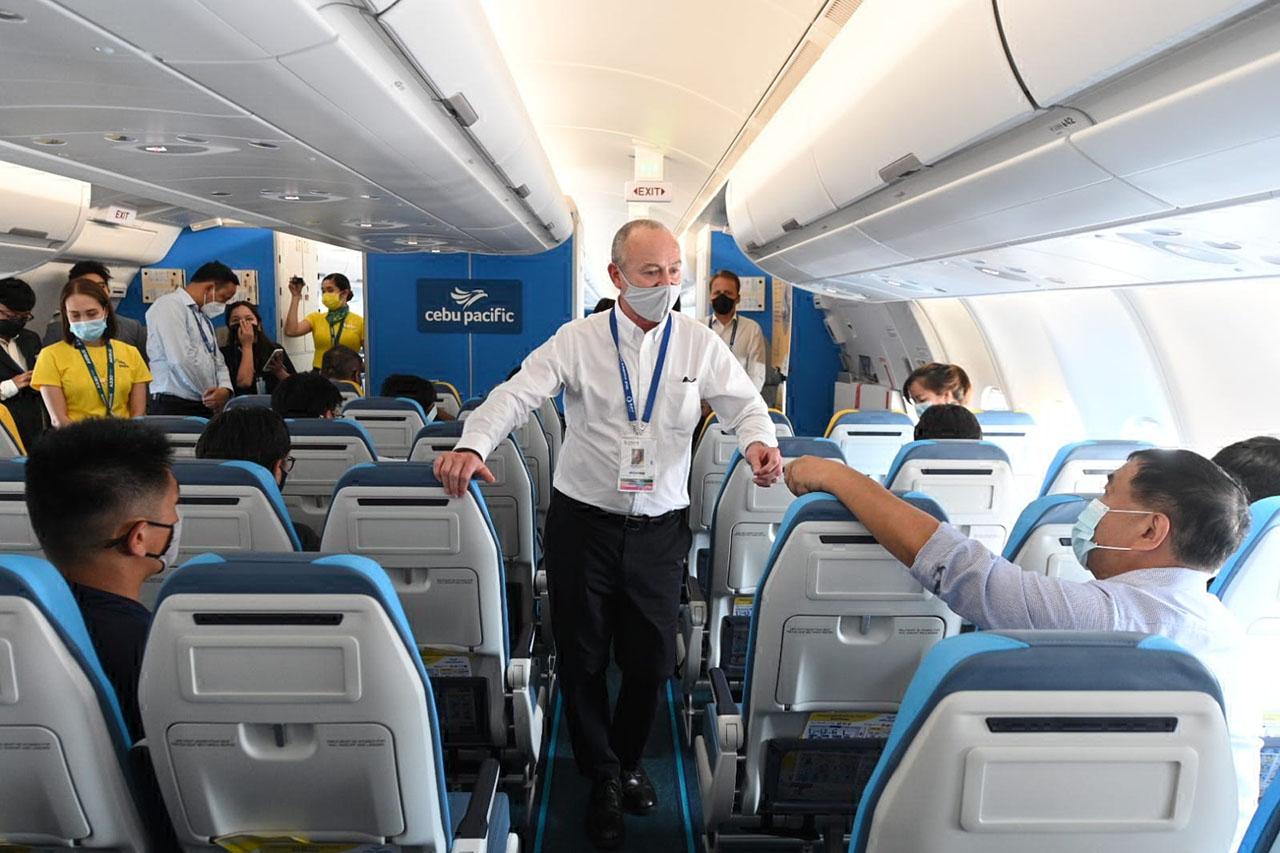
That openness of communication with stakeholders was matched by CEB’s policy during the pandemic to reach out to its customers and own staff, giving them the vital information they required, the answers to their most pressing questions. “For our customers, even when there were very few people flying, our challenge was to inform them of the specific requirements of their intended destinations. That's really where the communication and the reassurance was needed.”
Dealing with CEB’s own staff, there were other issues to address. “You can imagine the concerns that our staff had. I mean, they're thinking about what's the situation in terms of the health of the company? Are we going to be fine? Is this still a good job? So the internal communication was hugely important. Without that, we wouldn't have had the support of the people and they all played their part. We asked them to participate in some very tough decisions. And they did. They absolutely helped us through the tough days.”
Changing with the Times
As of January 1, 2023, after serving as CEB’s longtime executive chairman, James L. Go was stepping down to give way to his nephew, Lance Y. Gokongwei, who himself had served for 25 years as CEB president and CEO. To complete this reshuffle at the top, Mike was appointed CEO, sharing leadership duties with Alexander Lao, who stepped up as president while concurrently serving as the airline’s chief commercial officer.
After this interview, we were able to ask Lao about his working relationship with Mike, and received a glowing response. "It's been great working with Mike in CEB. He has boundless energy and persistence along with the ability to go up and be very strategic while also being able to go deep into the details. His deep airline and senior management experience gives us insight on how to approach issues.”
Lao also shared, “He is not afraid to share his experiences, asking us what we think while challenging us in CEB to have honest, frank, and respectful conversations. At the same time, he is humble enough to say when he won't know and ask for help, which I think is something that many leaders hesitate to say. Lastly, he's not afraid to do what is right, even if it's hard— a strength that all of us can draw from."
While changes in management was bound to happen sooner or later, it was facilitated by the signing into law of Republic Act 11659, which, among other provisions, redefines what constitutes a public service company and removes foreign equity restrictions on these said companies, clearing the way for Mike’ ascension to CEB’s top executive post.
One question that arises out of all this is the possibility of foreign-owned companies setting shop in the Philippines to make a dent in our aviation sector. Is Mike worried about the possibility of new competition? “Bring them on!” he says. “In theory, one of the big foreign airlines can come in and set up their own airline here or buy an airline here. Well, we've got to stand up to the best that's out there. Heaven forbid that we ever got into a situation where we are worried about competition, thinking we can’t compete. We've got to say that we can compete with anybody.”
Don’t mistake this confidence for complacency, as Mike is first to admit that CEB has some way to go before it can truly compete with the world’s best. “My challenge to my team here is that we may be best in class here, but how would we stand up against a Ryanair? It's good that there are places that we can aim, we can look at companies like Ryanair or we could look at Wizz Air, some of the 'best in class' out there. What can we adopt from them?”
So, are there any big changes coming CEB’s way now that he’s the CEO, we wonder? Having helped chart the course over the last several years, Mike says the company is sticking to what it’s always been about, which has been to democratize travel, offer low-cost fares, deliver value and great service to its passengers. At the same time, he has an eye on continuous improvement. “We're going to stay true to what we are at a core. I think we're more efficient now than we were prior to the pandemic. The restructuring has helped us, but we're still going to stay true to our roots.”
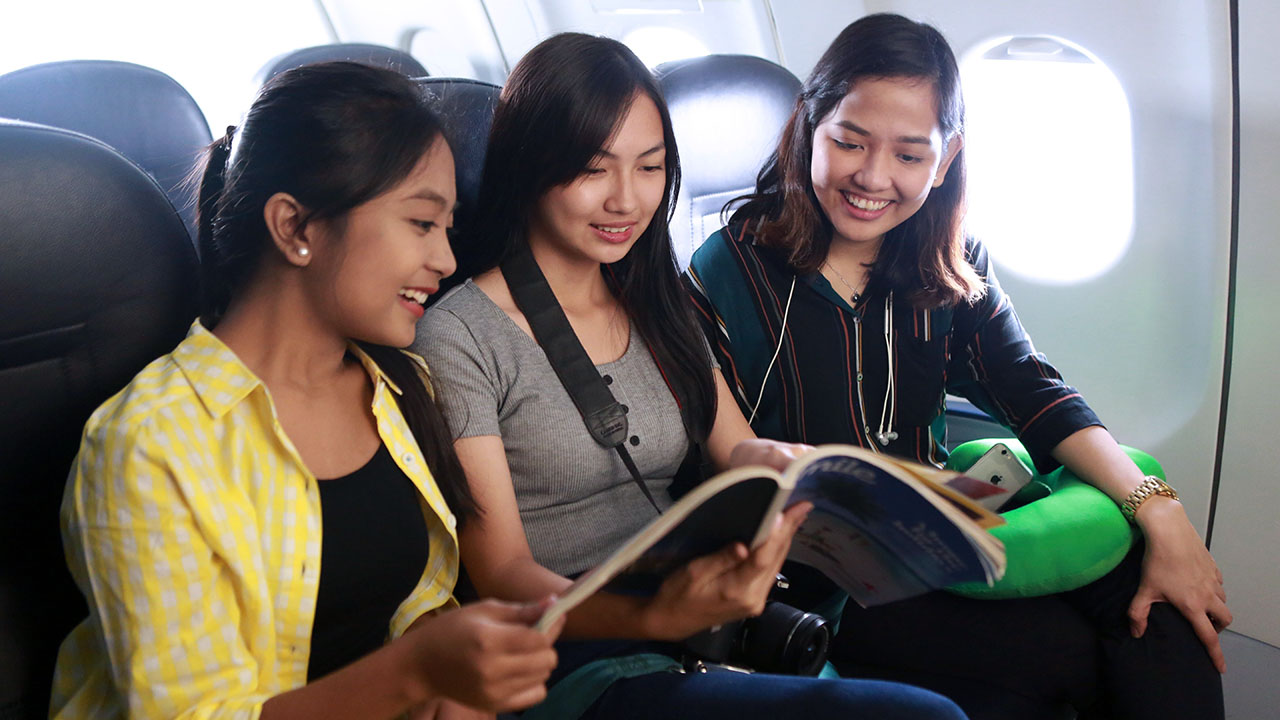
Elaborating on this he says, “Because of the pandemic, there are markets that we should be targeting to grow into. But our business approach, our strategy is the same, just do it better. Have more direct interactions with our customers, more digital interactions with our customers, become more efficient in terms of our internal processes, and have better interaction and better understanding of our own internal customers, our staff.”
As Mike suggests, the growing digitalization of CEB’s operations has been an essential part of improving the customer journey in recent years, whether it’s for booking tickets, customer service, self-check in and baggage drops, and the like. “Digitalization serves us brilliantly, as it ties in fantastically with low cost. The majority of digitalization is all about efficiency, streamlining, and it's also about self-service. Inevitably, if you do it well, you pull costs down. So, we've got to be brilliant on the digital side, with our customers and with our staff.”
Mike acknowledges that some customers may still not be able to transact digitally and CEB could potentially lose this segment. If that’s the price to pay for moving headlong into the future, so be it. “We've got to go where 99.9% of the market is going to go, we've got to be quite rigid in that. Digital, we're absolutely all in, and we will continue to go into that space.”
This Is Home
When each work day ends, Mike rushes home to be with his family. “I love to hang out with my little girls. They're fantastic, they're an absolute joy. Actually, the best time we have is when it's just me, the girls, and my wife.” Recounting the family’s recent holiday in the UK over the Christmas and New Year break, where it was just the four of them and no household staff, Mike candidly shares that he thoroughly enjoyed doing chores and parental duties, “including changing the diapers and all that sort of stuff!”
While the pressures of becoming a father again haven’t impacted his approach to work (“I still work long hours, that’s just the nature of the job”) Mike says it made him aware of the need to compartmentalize and look after his health. “When my three year old was born, I worked out that I'd be 74 when she turns 21. And I thought, yeah, I want to be an active 74 year old, so what it did was make me look at myself. Now, I'm very much more serious about the exercise that I do. I'm more careful about what I eat.”

With that in mind, Mike became a vegetarian three years ago. “I did it not because of ethical reasons, though there are plenty, but because all the research says you'll be healthier and you'll live longer. So, for purely selfish reasons in many ways. I'm conscious about trying to stay fitter and healthier because I want to enjoy being with my daughters, not just growing up, but when they're older as well. I want to be a very active 70, 80, 90, 100-year-old, whatever it might be!”
Looking back on the Philippine experience so far, now entering its seventh year this February, Mike says, “It genuinely is a lot of fun. The Philippines is certainly anything but boring. Filipinos are very warm and I think the culture's great to live and work in. I feel like it's easy now. To be honest, I don’t even have to think about it – it's home to me now.” — Pierre A. Calasanz
For more information on Cebu Pacific, visit cebupacificair.com


